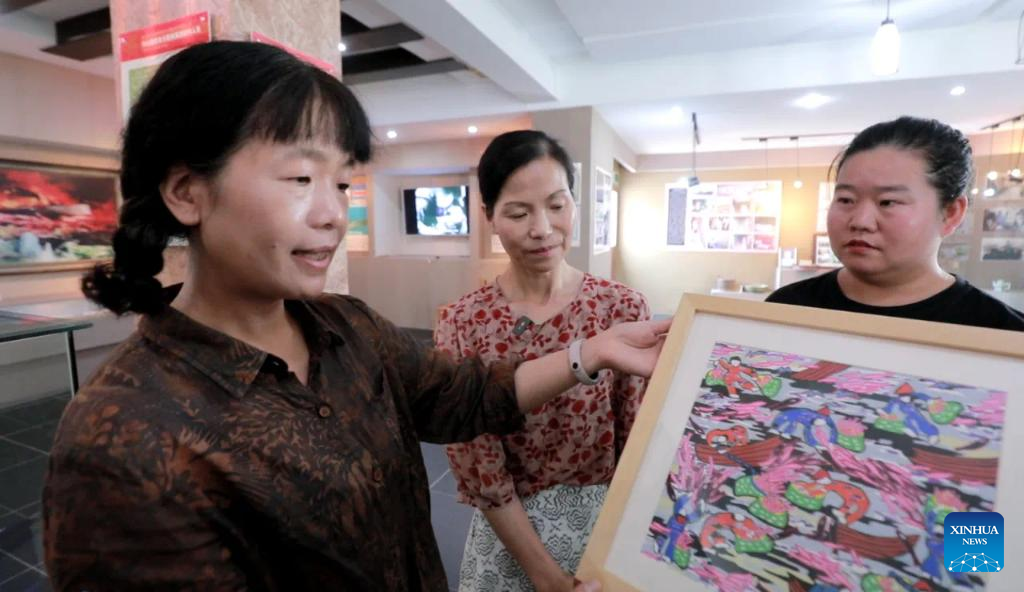
Wu Xiaofei (1st L), a painter on Dongji Island, shows the picture she drew as a gift in return for a painting from Britain about the Lisbon Maru incident in Zhoushan City, east China's Zhejiang Province, Sept. 6, 2023. (Xinhua)
HANGZHOU, Sept. 15 (Xinhua) -- After traveling nearly 10,000 km, a package from Britain arrived at the memorial hall of the Lisbon Maru incident on Dongji Island in Zhoushan City, east China's Zhejiang Province, in early September.
Inside the package was a painting depicting a scene in which British prisoners of war (POWs) can be seen doggedly evading a Japanese attack during World War II.
The painting belonged to Graham Saxby, a British man whose father was one of the POWs.
In October 1942, the Lisbon Maru, a cargo vessel requisitioned by the Japanese army to carry more than 1,800 British POWs from Hong Kong to Japan, was hit by the U.S. army off the Zhoushan Islands in Zhejiang.
A total of 384 British POWs were rescued by local Chinese fishermen, for which the British government and people were deeply grateful.
Saxby entrusted the painting to the Chinese Embassy in Britain, hoping to pass it on to the Chinese fishermen on Dongji Island as a present, at a New Year's reception on Feb. 19 for the relatives of Lisbon Maru survivors and other people involved in the incident.
A special screening of the documentary "The Sinking of the Lisbon Maru" was held in London on Aug. 15.
Survivors of the Lisbon Maru incident recalled in the film that after the ship was hit, the Japanese troops soon evacuated but left the POWs battened down below deck. The POWs managed to escape the confinement and started jumping into the sea, but were then shot at by the Japanese troops. Chinese fishermen risked their lives amid the shooting and rescued as many POWs as possible using their small sampan boats.
Retired British soldier Brian Finch, who has been committed to collecting historical documents concerning the Lisbon Maru, said the documentary exposed the cruelty of the Japanese soldiers and showed "the incredible courage and humanity" of the Chinese fishermen.
The Chinese Embassy in Britain handed the painting over to staff of the Zhejiang provincial government who attended the event, and entrusted them with taking it to the fishermen on Dongji Island.
The move was echoed by similar kindness in China.
After learning that Saxby was going to give the locals a work related to the Lisbon Maru incident, Wu Xiaofei, a painter on Dongji Island, drew a picture as a gift in return.
"My grandfather was one of the Chinese fishermen who took part in the rescue at the time, rowing a sampan back and forth several times to rescue the British POWs," Wu said. "As a descendant of the local fishermen, I came up with the idea to reciprocate the friendship of our British friends with a painting."
Wu finished her work, which shows the joy, unity and harmony of local fishermen, in just three days.
The friendship between the Chinese and British people, which has lasted for 81 years since the Lisbon Maru incident, is continuing.
To help bring the forgotten tragedy to light, Saxby is now commissioning a second work to show the rescue scene of the incident, while another painting related to the incident created by Wu has been completed and is ready for exhibition. ■



